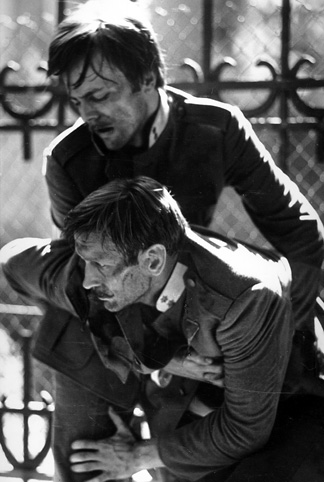Mysteries of St. George (lost Soviet anti-religious drama film; 1982)
Mysteries of St. George (Russian: Тайны святого Юра, Ukrainian: Таємниці святого Юра) is a 1982 Soviet anti-religious drama film directed by Valeryan Pidpaly and starring Andriy Kharytonov, Volodymyr Talashko & Elyzaveta Dedova.
Plot
World War I in Galicia. At the sound of the bells ringing in the Holy Jurassic Monastery, Roman, a young man of twenty, receives God's blessing and becomes a cornet in the Austrian army. He goes to the bloody massacre with determination to serve his country with honor. Roman experiences pain as he sees the front collapse, the arrival of Russians, and the injury of his friend. After escaping captivity, he returns to Lviv, where his beloved girlfriend Stefa advises him to seek help from Metropolitan Andrei. The head of the Uniate Church uses blind faith and people's devotion for selfish reasons, inciting national and religious discord. Roman is assigned to guard the archives in the cathedral cellars. By chance, he becomes acquainted with secret documents, from which he learns that the peace-loving metropolitan has long sold off the interests of the Ukrainian people to Austria-Hungary. The final straw that determined his change of heart was when Austrian gendarmes shot a peaceful demonstration of workers, who were demanding an alliance with Russia and an end to the war. Roman joined the struggle to liberate Western Ukrainians[1].
Production Crew
- Director: Valeryan Pidpaly
- Writer: Vladimir Dobrychev, Valeryan Pidpaly
- Direcor of Photography: Serhiy Lysetskyy, Oleksandr Pyshykov
- Music: Hennadyy Lyashenko
- Production Designer: Mykhaylo Rakovskyy
- Production Company: Dovzhenko Film Studio
Filming
The film was filmed in Lviv and at St. George's Cathedral[2].
Music
The music for the film was composed by the Ukrainian musician Hennadyy Lyashenko. The film featured the theme "Ave Maria" written by Austrian musician Franz Schubert[1].
Premiere
The film was theatrically released on December 6th, 1982[1]. In its first year of release, it was watched by 6.2 million people[3].
Awards
In 1983, actress Elyzaveta Dedova was awarded for her role as Stefa at the Kyiv Film Festival "Molodist-82"[4].
Availability
After the completion of its theatrical release, the film has never been aired on television or released on home media. Due to the current situation in Ukraine, it is unlikely that the film will ever be made available online.
External Links
References
- ↑ 1.0 1.1 1.2 V. F. Semerchuk, S. V. Skovorodnikova. Советские художественные фильмы. Аннотированный каталог (1982-1983). pp. 143-144. ISBN 5-88289-130-2
- ↑ Kino-Teatr.ru page on film (in Russian)
- ↑ Alexander Fedorov. Статические данные посещаемости советских фильмов: 1950-1990. p. 41
- ↑ Dovzhenko Film Studio's page on film (in Ukrainian)
